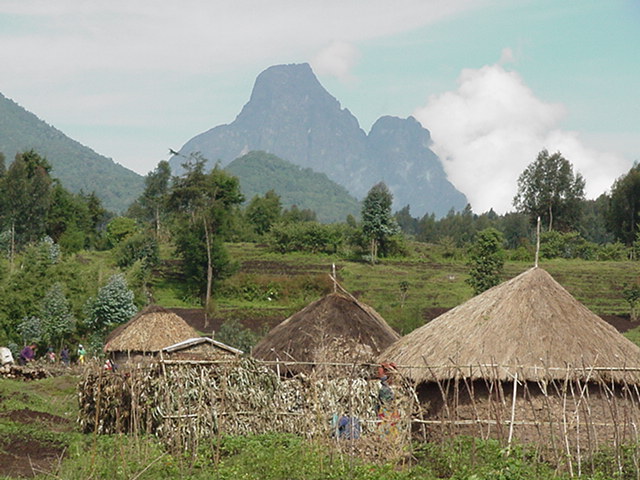WHRB Reporter Reflects on Time in Rwanda, by Claire Dailey

Rwanda, the land of a thousand hills, is a country that had always held a certain fascination for me throughout my time in college. So, this past January, I found myself on a plane headed to the capital city of Kigali to spend a semester studying abroad. When the wheels of my plane hit the tarmac, I was overly excited to explore this completely new place with such a complicated history. I want to share with you small anecdotes about the places, the lessons, the politics, as well as the people that call this beautiful country home.
The first few weeks I found myself getting used to the hectic bus system, the rice and plantains, and my new home. I was staying with a host family in the neighborhood of Nyamirambo. Nyamirambo is an eclectic mix of barber shops, karaoke bars, and small kiosks, all with brightly painted store fronts and a handful of patrons always stationed out front. Being the oldest neighborhood in Kigali, its culture is all its own. Kigali is a very structured town, where people stick to the same schedules and spend much of their day at work. However, Nyamirambo never sleeps. No matter what time I came home there were always disco lights spinning and men drinking Primus beer outside the small neighborhood bars.
My host family is the greatest gift I could have ever received. They taught me so much about community, respect and what it means to be an empowered woman. My mom, a widow, holds a high position in UNICEF and is always traveling, all the while she is finishing up her dissertation at a university in Kampala, Uganda. My oldest sister Jessica, who was my best friend in Kigali, graduated top in her class in economics and entrepreneurship. Jovine is an aspiring architect who also models in small shows around the city. Junior and Jennifer are the two siblings who were often off at boarding school, but the house was always brighter when they were home. Nora is my mom’s sister, a beautiful woman who straddles the line of sister and mother for the family. Her daughter, Nana, is difficult for me to describe. I miss her laugh, her sparkle, her big eyes, and all of her drama. If she’s not an actress in twenty years, I will be shocked.
Besides my attempt at learning Kinyarwanda, the local language, my time at school was centered around learning about Rwanda’s past and how it has recovered. The genocide of 1994 left one million Rwandese dead and around three million Rwandese living outside of the country. With no infrastructure or leadership, it was unclear how this wrecked nation could ever even begin to rebuild.
Fast-forward twenty years and it is near impossible to believe that Kigali is the same city. *Palm-tree lined roads, neighborhoods with giant stucco houses and even its first sky scraper, Kigali is developing at a rapid pace. President Paul Kagame has crafted a campaign centered around unity, whereby Rwandans are neither Hutu nor Tutsi nor Twa, but Rwandan. Talk of these three ethnic groups is forbidden. In fact, talk of differences amongst Rwandans is also highly looked down upon. Rwanda’s new constitution has in it a law against preaching any ‘genocide ideology,’ which in theory is a wholly positive move towards healing past wounds. However, President Kagame has allowed for this law to be employed in many different ways, stifling political dissent and free speech. This includes arbitrary arrests, the disappearance of dissenters, and the deaths of former intelligence chiefs, opposition leaders, and the director of the Rwandan Development Bank.
Personally, I find President Kagame’s leadership troubling, as an American, free speech is of the upmost importance to me. However, seeing as how the usage of the radio in 1994 led to such extreme mass murder, I do not know if it is my place to say what Rwanda should or should not do as a country that continues to try to heal its wounds.
The next presidential election is scheduled for 2017. I attended a week-long conference put on by the African Development Bank for my job in Kigali. There, President Kagame was asked if he would run again in the next election. His response was his quintessential, overused: “ Why do you always focus on when I am going to leave instead of what I am doing now.”
Again, as an American, the rule of one man for term after term is disconcerting. But what if he is what Rwanda needs. But he is violating the rights of individuals, not to mention the shady money that changes hands between Rwanda and Congolese rebels. But Rwanda has been stable for twenty years and the standard of living is on the rise along with foreign investment and tourism.
This is the back and forth that continues in my head even today, as I am back at school in Massachusetts. I believe that understanding both sides of the political situation is important; however, I truly think that it will be up to Rwanda, what its political future holds. My prediction is that President Kagame will continue to be a force in the nation’s policymaking and politics, whether it be he himself as President or a groomed replacement, though time will tell.
Until then, my memories of Rwanda will forever consist of taking motorcycle rides through the winding hills where the street lamps look like stars, gazing out onto the waters of Lake Kivu, eating goat brochettes and drinking Primus, bargaining for mangoes and passion fruit, and always tucking in my mosquito net before bed.
I am eternally grateful for the seven months that Rwanda gave me. I will hold the memories with me forever.